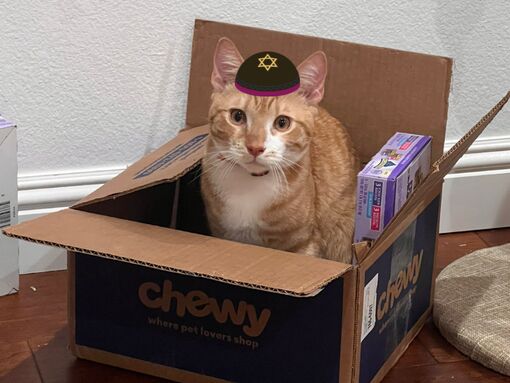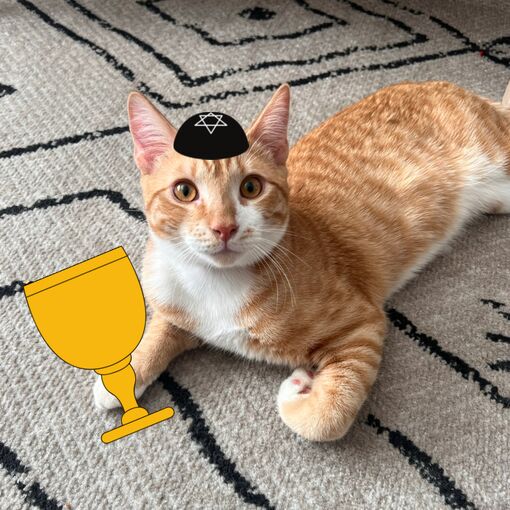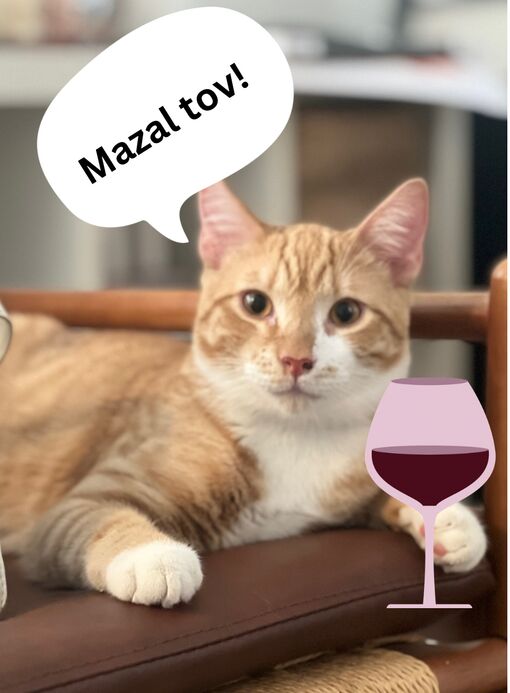Annelise & Matthew
Annelise & Matthew
Introduction
INTRODUCTION
Our wedding will be held in the Modern Orthodox tradition of Judaism. This traditional wedding may be unlike other Jewish weddings you have attended and quite unlike any non-Jewish wedding you have been to.
Modern Orthodox weddings typically require certain roles and behaviors from men and women* respectively - however, if you just go with the flow and follow the lead of the other guests, we promise everything will be okay and no one will be offended.
If you'd like to learn more about Modern Orthodox weddings and what your role is, read on! You can also find out more here: https://www.brides.com/jewish-wedding-traditions-4783360
*While these men/women roles and behaviors are typically assigned to people assigned as male/female at birth, please feel free to participate in whichever way you prefer. We are intending to foster an inclusive and loving environment.

A Note About Singing...
Jewish weddings are heavy on singing. Luckily, you don't need to know the words to sing Jewish songs!
Because there are *so* many Jewish songs and it is impossible to remember all the words, many people just replace lyrics with nay nay nay (this is pronounced like the first half of the word 'nice'). We also replace words with slapping the table, stamping feet, clapping, and jumping up and down.
It may sound a little silly, but this is genuinely what we do when we don't know the words! Sometimes we do this even when we do know the words because it can be fun just to let loose. So don't feel shy and feel free to join in - the point is to be happy and have fun!
If you want to hear some of the songs you can expect to hear at the wedding, here are some traditional ones:
1. Od Yeshama and lyrics with translation
2. Siman Tov and lyrics with translation

Kabbalat Panim/Bride's Greeting
For women
As guests begin to arrive, women will be encouraged to go to the bedeken area. The bride will be sitting with her bridesmaids, mother, and mother-in-law and greeting her female guests.
In Jewish tradition, God is especially receptive to the prayers of a bride on her wedding day. Accordingly, the bride will issue personalized prayers for each guest that asks for one. These prayers aren't necessarily traditional prayers in Hebrew, but rather heartfelt hopes and wishes for the guest (and spoken in English so everyone can understand).
There is no pressure to receive a prayer if you don't want one. That said, this particular bride really enjoys telling people how much she loves them and thinks they are beautiful to their face, so don't be shy!
Tish/Ketubah Signing
For men
In Judaism, a tish is a joyous celebration around the Rabbi's table, usually in celebration of a momentous Jewish event. In this context, it is a celebration of the signing of the Jewish marriage contract, the ketubah.
The ketubah outlines the groom's responsibilities to the bride throughout their marriage. The text of the ketubah is standard and written in Aramaic, an ancient predecessor to Hebrew. It is signed by two Jewish male witnesses who are not related to the bride or groom, as well as the Rabbi. The ketubah is read out loud in full by the Rabbi at the ceremony.
The tish serves as an opportunity for male guests to meet and greet. There will usually be singing of traditional songs as well as a dvar torah (sermon) from the Rabbi.
Once the ketubah is signed and the tish is over, the men will escort the groom to the bedeken area.
Bedeken
Bedeken - rooted in the Hebrew word 'bedikah' or 'checking' - is the tradition of lifting the bride's veil to check that she is actually the bride. The tradition stems back to the biblical story of Jacob, Leah, and Rachel, when Jacob was tricked into marrying Leah instead of Rachel because Leah was wearing a thick veil that obscured her face.
Once the men finish signing the ketubah, they will escort the groom to the bedeken area (usually running, clapping, and singing), and the groom will lift the bride's veil to 'check' that it is actually her. This will also be the first time the groom sees the face of his bride on their wedding day. Afterwards, the men will escort the groom out of the room and guests can begin to congregate for the ceremony.

CEREMONY
There is a lot of tradition and many rituals that occur during the Jewish wedding ceremony. There will be a chuppah (cloth canopy), there will be some circling, there will be blessings in Hebrew, and there will be some glass smashing. If you want to learn more about the meaning of these rituals, you can read about it here (we will also probably distribute some kind of primer on the day).
Other than those who have been asked to participate in saying certain prayers, the rest of the audience doesn't have much of a role here. However, you are encouraged to offer a 'Mazal Tov!' or an 'Amen!' when prompted. Just sit back and enjoy!

POST CEREMONY/RECEPTION
Yichud/Alone Time
Immediately after the ceremony, the married couple is escorted to a secluded room to be alone with one another as man and wife - this is called 'yichud' or togetherness. The yichud ceremony allows the married couple a few moments to breathe, take it all in, and get excited about being married.
The wedding guests will typically escort the couple to the yichud room at the conclusion of the ceremony, usually with singing and dancing. Feel free to join the crowd! See the note above about singing.
Once the couple arrives at the yichud room, several male guests will stand guard to ensure that the couple is not disturbed. The couple will remain in the room for a few minutes before rejoining the party and taking photos.
Reception Blessings
Blessings will be recited in Hebrew over bread. It is recommend that you don't start eating anything until the blessing over bread is recited. You may see people washing their hands with a ceremonial cup before eating bread. Feel free to wash your hands if you want to, but no pressure to use the ceremonial cup or recite the blessing.
Post Reception/Grace After the Meal
The rest of the reception will largely look like any other wedding you've been to - dancing, eating, drinking, all the good stuff. However, at the end of the meal, guests who said a blessing over bread will recite several post-meal prayers to thank God for the meal. Whereas the pre-meal blessing over bread is very short, these post-meal prayers can be long and take between 10 - 15 minutes to recite aloud in full.
We will be distributing booklets with the prayers (in English and Hebrew) should you wish to participate (the blessings will be in Hebrew, but you are welcome to read along silently in English). The booklets are for you to keep - these are traditional Jewish wedding favors. However, because the prayers can take a while, you are welcome to step outside while they are happening. We just ask that you respect the prayers and not make a lot of noise while they are ongoing. This will also be the last thing that happens at the wedding, so if you're ready to call it a night, feel free to do so.
